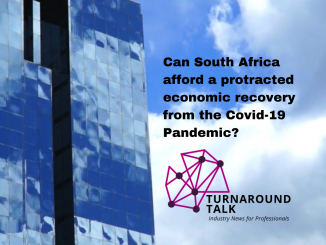

Founder: Turnaround Talk
From time to time, there are events that define a profession. These events are often cited as turning points and are used as case studies for future professionals to look back on and learn key a key lesson or two.
In 2020, the South African turnaround profession was thrust into the spotlight with the business rescues of South African Airways and Edcon. The SAA rescue proved significant as there are still concerns about the role of the company’s strategic equity partner as well as Mango which is an SAA subsidiary and is facing its own significant liquidity issues.
One of the key lessons that businesses have been encouraged to learn is agility and adaptability. Operational diversification is a tool that can be used as a coping mechanism against the worst impacts of the Covid Pandemic. Comair highlighted this as a risk when it said that the rising cost of fuel is a major reason for the failure of the company’s business rescue plan.
Albert Einstein once said: in adversity lies opportunity. Sasol, who itself is a victim of a volatile oil price, has learned a key lesson from the Comair rescue and now diversifying into sustainable aviation fuels.
The News24 article points out that Sasol’s sustainability business has announced two new international partnerships to develop sustainable aviation fuels.
The first is a consortium known as Green Fuels Hamburg and aims to decarbonise the aviation sector. Sasol ecoFT will be working alongside German-based energy companies Uniper and Siemens Energy and European aircraft manufacturer Airbus to investigate the feasibility of producing carbon-neutral or green kerosene – a sustainable aviation fuel, in Germany.
If it is feasible, at least 10 000 tons of green kerosene will be produced annually for the aviation sector from the year 2026. This comes almost two years after Sasol posted a R90 billion loss.
If successful this will be a major case study in future lesson plans on how to incorporate agility into a changing operation model.
Lesson one: get support
The News 24 article points out that the consortium is supported by the Technical University of Hamburg, a consultant partner, the Hamburg Senate and Hamburg Airport. According to the statement issued by Sasol ecoFT, Emirates Airline has also expressed interest in using the power-to-liquid kerosene produced.
Hamburg has been identified as a good location for the large-scale project – the region is close to renewable energies and has customers in aviation.
The article adds that a large-scale commercial plant to produce green hydrogen using renewable electricity from offshore wind turbines, will be built in the Port of Hamburg. The power-to-liquid fuels plant will use Fischer-Tropsch technology – that Sasol is known for – to convert green hydrogen into carbon-neutral kerosene, a sustainable aviation fuel.
“On the way to climate neutrality, green hydrogen is a key technology of the future … The market ramp-up of hydrogen is one of the most important projects in northern Germany’s economic and energy policy and is of immense importance for the whole of Germany,” noted Michael Westhagemann, senator for economical affairs and innovation. Sustainable aviation fuels – which reduce carbon emissions – will be increasingly important as air travel picks up.

Photo By: Bruce Bennett/Getty Images
“Green fuels based on hydrogen will play a decisive role in the decarbonisation of air transport and maritime shipping,” said Jens Kerstan, senator for environment, climate, energy and agriculture. Kerstan added that Green Fuels Hamburg would also help transform Hamburg’s economy and achieve its climate targets. “We therefore support the consortium and very much welcome the fact that it is helping to move Hamburg towards a climate-neutral future.”
Lesson two: team up to level up
The News24 article points out that Sasol ecoFT also entered into a Memorandum of Understanding with German aircraft manufacturer Deutsche Aircraft to develop technology for sustainable aviation fuel using green hydrogen.
Deutsche Aircraft is developing a smaller, efficient aircraft – the D328eco – which aims to be carbon neutral. The aircraft is scheduled to be certified in 2026 and will use green hydrogen-based sustainable aviation fuels alongside another certified sustainable aviation fuel and regular kerosene.
The article adds that, Helge Sachs, senior vice president of Sasol ecoFT, noted the importance of considering the whole aviation value chain to achieve climate neutrality. “Joining forces between aircraft manufacturers and fuel producers is vital, if we want to ensure that aviation becomes sustainable, while ensuring the highest possible safety standards,” said Sachs.
Closer to home, Sasol is also part of a consortium known as HyShiFT, which is developing a sustainable aviation fuel in Secunda. Other partners in the consortium include German-based renewable energy company Enertrag and chemicals company Linde.

Photo By: Sasol
Keep an open mind
The last key lesson that can be learned when incorporating agility into a business model is keeping an open mind.
When pressed about the challenges that Comair faced, Cliffe Dekker Hofmeyr Director – Lucinde Rhoodie – pointed out that a challenge when it came to securing post commencement financing is that the company is business rescue has to put up an asset that can be used as surety against future risk. She said that it is possible that the financers felt that Comair didn’t have assets that were valuable enough to use as a guarantee against the risk of rising fuel prices.
There are concerns that the price of domestic air travel in South Africa may skyrocket to become three or four times more expensive than it currently is. This would price air travel out of the reach of most South Africans and would be a death kneel for domestic airlines. This cannot happen and many turnaround professionals feel that someone will step in and fill the gap left by Comair. Perhaps this move by Sasol, while future focused, is the statement of intent that the industry needed to encourage the hero to step forward.




